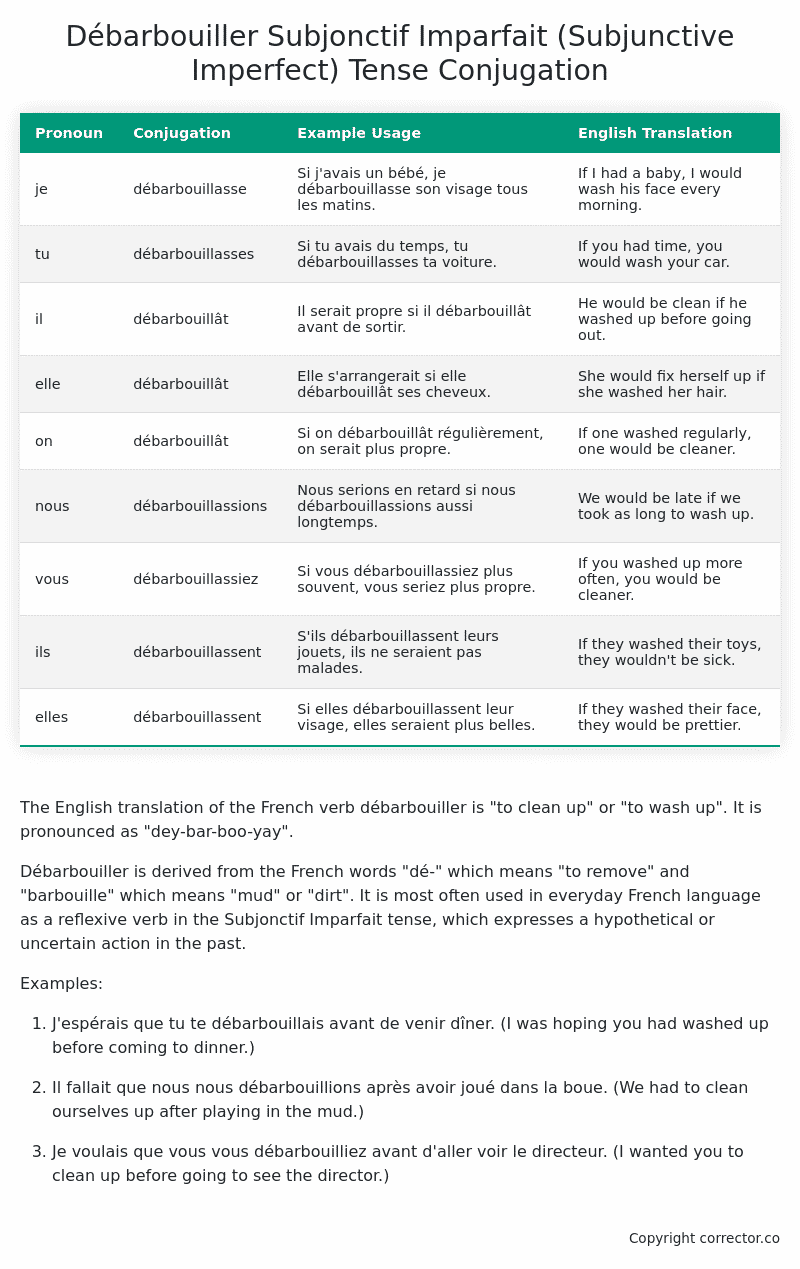Subjonctif Imparfait (Subjunctive Imperfect) Tense Conjugation of the French Verb débarbouiller
Introduction to the verb débarbouiller
The English translation of the French verb débarbouiller is “to clean up” or “to wash up”. It is pronounced as “dey-bar-boo-yay”.
Débarbouiller is derived from the French words “dé-” which means “to remove” and “barbouille” which means “mud” or “dirt”. It is most often used in everyday French language as a reflexive verb in the Subjonctif Imparfait tense, which expresses a hypothetical or uncertain action in the past.
Examples:
-
J’espérais que tu te débarbouillais avant de venir dîner. (I was hoping you had washed up before coming to dinner.)
-
Il fallait que nous nous débarbouillions après avoir joué dans la boue. (We had to clean ourselves up after playing in the mud.)
-
Je voulais que vous vous débarbouilliez avant d’aller voir le directeur. (I wanted you to clean up before going to see the director.)
Table of the Subjonctif Imparfait (Subjunctive Imperfect) Tense Conjugation of débarbouiller
| Pronoun | Conjugation | Example Usage | English Translation |
|---|---|---|---|
| je | débarbouillasse | Si j’avais un bébé, je débarbouillasse son visage tous les matins. | If I had a baby, I would wash his face every morning. |
| tu | débarbouillasses | Si tu avais du temps, tu débarbouillasses ta voiture. | If you had time, you would wash your car. |
| il | débarbouillât | Il serait propre si il débarbouillât avant de sortir. | He would be clean if he washed up before going out. |
| elle | débarbouillât | Elle s’arrangerait si elle débarbouillât ses cheveux. | She would fix herself up if she washed her hair. |
| on | débarbouillât | Si on débarbouillât régulièrement, on serait plus propre. | If one washed regularly, one would be cleaner. |
| nous | débarbouillassions | Nous serions en retard si nous débarbouillassions aussi longtemps. | We would be late if we took as long to wash up. |
| vous | débarbouillassiez | Si vous débarbouillassiez plus souvent, vous seriez plus propre. | If you washed up more often, you would be cleaner. |
| ils | débarbouillassent | S’ils débarbouillassent leurs jouets, ils ne seraient pas malades. | If they washed their toys, they wouldn’t be sick. |
| elles | débarbouillassent | Si elles débarbouillassent leur visage, elles seraient plus belles. | If they washed their face, they would be prettier. |
Other Conjugations for Débarbouiller.
Le Present (Present Tense) Conjugation of the French Verb débarbouiller
Imparfait (Imperfect) Tense Conjugation of the French Verb débarbouiller
Passé Simple (Simple Past) Tense Conjugation of the French Verb débarbouiller
Passé Composé (Present Perfect) Tense Conjugation of the French Verb débarbouiller
Futur Simple (Simple Future) Tense Conjugation of the French Verb débarbouiller
Futur Proche (Near Future) Tense Conjugation of the French Verb débarbouiller
Plus-que-parfait (Pluperfect) Tense Conjugation of the French Verb débarbouiller
Passé Antérieur (Past Anterior) Tense Conjugation of the French Verb débarbouiller
Futur Antérieur (Future Anterior) Tense Conjugation of the French Verb débarbouiller
Subjonctif Présent (Subjunctive Present) Tense Conjugation of the French Verb débarbouiller
Subjonctif Passé (Subjunctive Past) Tense Conjugation of the French Verb débarbouiller
Subjonctif Imparfait (Subjunctive Imperfect) Tense Conjugation of the French Verb débarbouiller (this article)
Conditionnel Présent (Conditional Present) Tense Conjugation of the French Verb débarbouiller
Conditionnel Passé (Conditional Past) Tense Conjugation of the French Verb débarbouiller
L’impératif Présent (Imperative Present) Tense Conjugation of the French Verb débarbouiller
L’infinitif Présent (Infinitive Present) Tense Conjugation of the French Verb débarbouiller
Struggling with French verbs or the language in general? Why not use our free French Grammar Checker – no registration required!
Get a FREE Download Study Sheet of this Conjugation 🔥
Simply right click the image below, click “save image” and get your free reference for the débarbouiller Subjonctif Imparfait tense conjugation!

Débarbouiller – About the French Subjonctif Imparfait (Subjunctive Imperfect) Tense
Formation
Common Everyday Usage Patterns
Interactions with Other Tenses
Subjonctif Présent
Indicatif Passé Composé
Conditional
Conditional Perfect
Summary
I hope you enjoyed this article on the verb débarbouiller. Still in a learning mood? Check out another TOTALLY random French verb conjugation!


